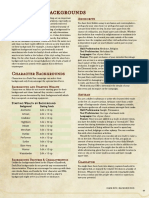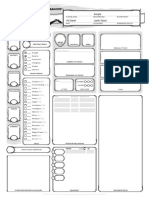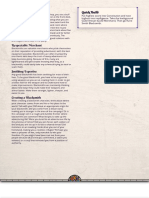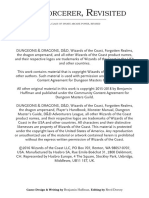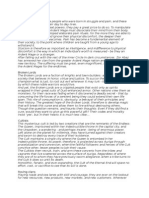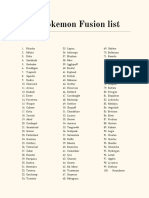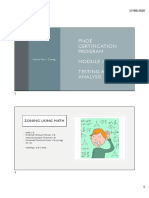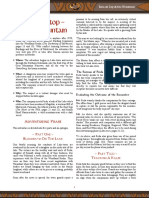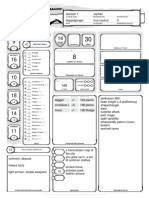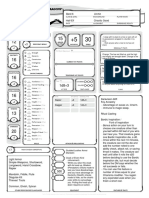0 ratings0% found this document useful (0 votes)
98 viewsD&D Dark Sun 5th Edition - 1 - House Rules
This document provides a summary of house rules for a Dark Sun campaign. It describes modifications to ability score generation, inspiration points, proficiency checks, feats, equipment sizes, and experience points. Magic items require identification, all characters gain a weak psionic power, and the document references variant rules for encumbrance, fear and horror, hitting cover, and hit point generation per level.
Uploaded by
Robson ScozCopyright
© © All Rights Reserved
Available Formats
Download as PDF, TXT or read online on Scribd
0 ratings0% found this document useful (0 votes)
98 viewsD&D Dark Sun 5th Edition - 1 - House Rules
This document provides a summary of house rules for a Dark Sun campaign. It describes modifications to ability score generation, inspiration points, proficiency checks, feats, equipment sizes, and experience points. Magic items require identification, all characters gain a weak psionic power, and the document references variant rules for encumbrance, fear and horror, hitting cover, and hit point generation per level.
Uploaded by
Robson ScozCopyright
© © All Rights Reserved
Available Formats
Download as PDF, TXT or read online on Scribd
You are on page 1/ 1
Dark Sun House Rules
This chapter describes the mechanical aspects of the
game, from Players Handbook character creation options MAGIC ITEM IDENTIFICATION
to Dungeon Master Guide Variant Rules. As explained in DMG:136, any magic or psionic item need to
be analyzed by an Identify Spell or similar method to be
revealed all its characteristics, like activation method,
ABILITY SCORES
charges, limitations, curses, etc.
Roll 4D6 six times, discard the dice with lower result on
each roll. Assign each result to your abilities as you see fit.
If the sum of all ability scores is below 75 roll again.
WILD TALENTS
All player character will roll on the table Wild Talents to
receive one weak and untrained psionic power.
INSPIRATION
All characters have a pool of up to 3 Inspiration Points.
When you spend one Inspiration point, you may choose
ENCUMBRANCE
to gain advantage on a roll of your character or an ally As described in PHB:176
that you can see and hear.
If one or more character spends together at least 3 EQUIPMENT SIZES
Inspiration Points, they may require the GM a beneficial As described in PHB:145
event change in the immediate story, like find the right
merchant to sell rare items, or to be found by some FEAR & HORROR
traveller with water to spare.
As described in DMG:266
Inspiration Points are recovered with good roleplaying of
their backgrounds (personality, bonds, flaws, ideals) at
FEATS
the end of each game session.
As described in PHB:165
PROFICIENCY CHECK VARIANT
HITTING COVER
When using a skill to perform an action related in some
meaningful way with your background, your character As described in DMG:272.
may have advantage on the check.
SKILLS WITH DIFFERENT ABILITIES
As explained on PHB:175, the GM may require that a skill
be associated with a different ability score for a specific
action.
HIT POINT PER LEVEL
When a character reaches a new level and must roll for
additional hit points, he or she may choose to reroll the
undesired result. However, doing so reduces the next roll
in an accumulative -1. Thus, a second roll of a fighter hit
dice would be 1D10-1; a third hit dice roll would be 1D10-
2, and so forth. All characters gain at least 1 hit point per
level.
EXPERIENCE POINTS AND LEVELING
Player characters will level up when they reach a GM-
predetermined milestone in the campaign. There will be
no XP rewards from encounters.
You might also like
- Dragonlance in 5th Edition - Campaign World & Adventures On Tribality86% (7)Dragonlance in 5th Edition - Campaign World & Adventures On Tribality6 pages
- Encounters, Season 10 - Council of Spiders PDF100% (8)Encounters, Season 10 - Council of Spiders PDF37 pages
- Paladin Variants: Options For Non-Good Patron DeitiesNo ratings yetPaladin Variants: Options For Non-Good Patron Deities12 pages
- D&D Dark Sun 5th Edition - 7 - PsionicsNo ratings yetD&D Dark Sun 5th Edition - 7 - Psionics57 pages
- D&D 4th Edition, Metamagic Home Brew Rules.100% (1)D&D 4th Edition, Metamagic Home Brew Rules.2 pages
- Saytr - Faun (Theros-Born) Wizard 5 (Diviner)No ratings yetSaytr - Faun (Theros-Born) Wizard 5 (Diviner)1 page
- 10 - D&D Druid - Circle of The Guardian - GM BinderNo ratings yet10 - D&D Druid - Circle of The Guardian - GM Binder3 pages
- D&D Dark Sun 5th Edition - 0 - Introduction100% (1)D&D Dark Sun 5th Edition - 0 - Introduction2 pages
- Circle of The Elementals - Druid SubclassNo ratings yetCircle of The Elementals - Druid Subclass4 pages
- Level Adjustment Guide - Dead in Limbo - v1.1No ratings yetLevel Adjustment Guide - Dead in Limbo - v1.17 pages
- D&D5e the DM Lair 5e 2014 to 2024 Conversion Guide for DM Lair Content100% (1)D&D5e the DM Lair 5e 2014 to 2024 Conversion Guide for DM Lair Content3 pages
- Sorcerer Revisited - by - Benjamin Huffman PF0% (1)Sorcerer Revisited - by - Benjamin Huffman PF5 pages
- Rybonator's Revised Ranger - A Homebrew Class and Subclasses For DND 5th EditionNo ratings yetRybonator's Revised Ranger - A Homebrew Class and Subclasses For DND 5th Edition4 pages
- Adjusting The Books: Stand Your Ground. When You Would Be KnockedNo ratings yetAdjusting The Books: Stand Your Ground. When You Would Be Knocked11 pages
- Monster Special Ability Collection The DM LairNo ratings yetMonster Special Ability Collection The DM Lair8 pages
- Way of The Elements Revised Monastic Tradition Mark Hulmes Tabletop WeeklyNo ratings yetWay of The Elements Revised Monastic Tradition Mark Hulmes Tabletop Weekly9 pages
- Eberron Compendium Karrnath Bloodletter v1 - GM BinderNo ratings yetEberron Compendium Karrnath Bloodletter v1 - GM Binder1 page
- Shadowdark Base Classes - Fighter, Priest, Thief, Wizard100% (1)Shadowdark Base Classes - Fighter, Priest, Thief, Wizard6 pages
- Shadowdark New Classes - Plague Doctor, Witch Hunter and Chaos Sorcerer100% (1)Shadowdark New Classes - Plague Doctor, Witch Hunter and Chaos Sorcerer7 pages
- Adventure Lv0 - Trial of The Slime LordNo ratings yetAdventure Lv0 - Trial of The Slime Lord18 pages
- Module II - Lesson 1 - What Does Testing Tell Us - PPT NotesNo ratings yetModule II - Lesson 1 - What Does Testing Tell Us - PPT Notes7 pages
- Module I - Lesson 2 - Respiratory System - PPT NotesNo ratings yetModule I - Lesson 2 - Respiratory System - PPT Notes9 pages
- Module II - Lesson 5 - Intensity Zoning - PPT NotesNo ratings yetModule II - Lesson 5 - Intensity Zoning - PPT Notes10 pages
- Module II - Lesson 2 - Ramp Test Preparation - Parameter Checks - PPT NotesNo ratings yetModule II - Lesson 2 - Ramp Test Preparation - Parameter Checks - PPT Notes14 pages
- D&D Dark Sun 5th Edition - 9 - Animal CompanionsNo ratings yetD&D Dark Sun 5th Edition - 9 - Animal Companions1 page
- D&D Dark Sun 5th Edition - 6 - Survival RulesNo ratings yetD&D Dark Sun 5th Edition - 6 - Survival Rules1 page
- Spells & Rituals Spell Name Mystic Traditions Spell Name Mystic Traditions Spell Name Mystic TraditionsNo ratings yetSpells & Rituals Spell Name Mystic Traditions Spell Name Mystic Traditions Spell Name Mystic Traditions3 pages
- Barbarian / Druid Folk Hero Tord Tiefling NG: StrengthNo ratings yetBarbarian / Druid Folk Hero Tord Tiefling NG: Strength3 pages
- Dragonfire Stickers 020619 Fighter Class Trees With Release MarkersNo ratings yetDragonfire Stickers 020619 Fighter Class Trees With Release Markers32 pages
- Resistances - Fire: Bard 1 LuisbernardaplacadorNo ratings yetResistances - Fire: Bard 1 Luisbernardaplacador4 pages
- Return To Ravnica Frequently Asked Questions: General Notes Release InformationNo ratings yetReturn To Ravnica Frequently Asked Questions: General Notes Release Information34 pages









